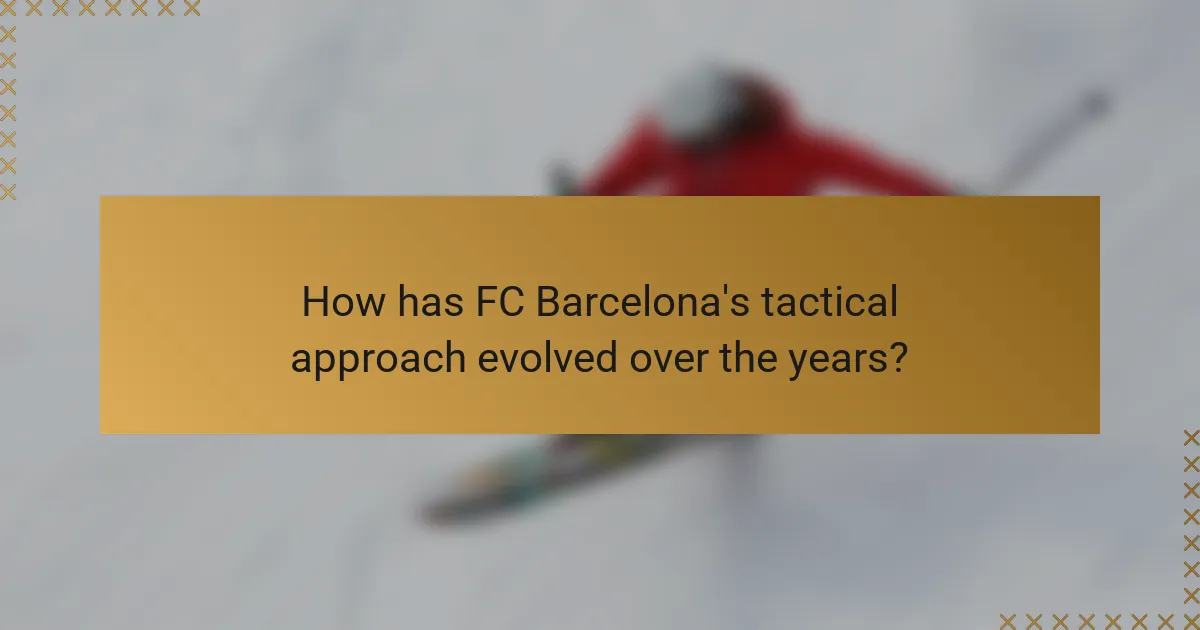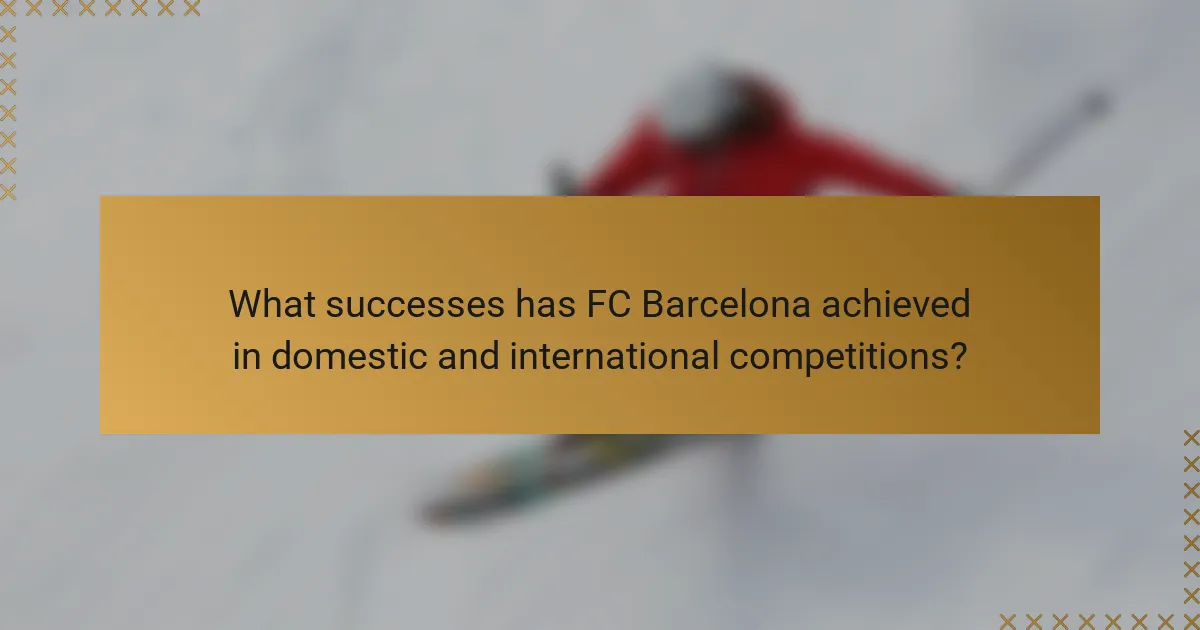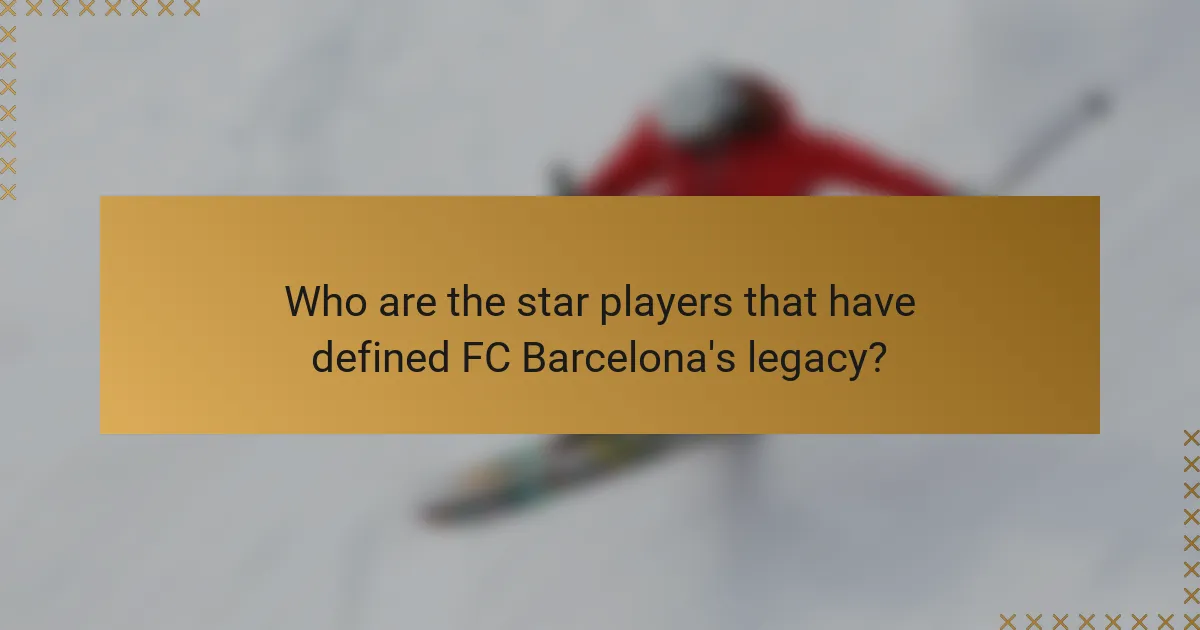FC Barcelona has transformed its tactical approach, achieving remarkable success through possession-based football and innovative strategies. The club’s evolution includes the iconic tiki-taka system and adaptability under various managers. Key players like Lionel Messi, Xavi, and Iniesta have been instrumental in this journey, contributing to numerous titles, including 26 La Liga championships and 5 UEFA Champions League victories. Additionally, the emphasis on youth development through La Masia has solidified Barcelona’s legacy in football.

How has FC Barcelona’s tactical approach evolved over the years?
FC Barcelona’s tactical approach has evolved significantly, emphasizing possession-based football and fluid attacking play. Initially rooted in a more direct style, the team shifted towards a tiki-taka system under Pep Guardiola, focusing on short passes and movement. This evolution continued with variations in pressing intensity and defensive organization, adapting to different managerial philosophies and player capabilities. Notable successes include multiple UEFA Champions League titles and La Liga championships, showcasing the effectiveness of their tactical adaptations. Star players like Lionel Messi have been integral, embodying the club’s tactical principles through their exceptional skill and vision.
What are the key tactical philosophies that define FC Barcelona?
FC Barcelona’s tactical philosophies center around possession-based play, high pressing, and fluid attacking movements. These strategies have evolved through various coaching tenures, emphasizing ball control and spatial awareness.
Key elements include:
– **Tiki-taka**: Short passing and movement, maintaining possession to tire opponents.
– **Positional play**: Players occupy specific zones, enhancing team structure and creating passing lanes.
– **Pressing**: Immediate recovery of possession through coordinated high pressing tactics.
– **Youth development**: La Masia academy fosters talent embodying the club’s philosophy.
These approaches have led to significant successes, including numerous La Liga and UEFA Champions League titles. Star players like Lionel Messi exemplified these tactics, showcasing exceptional skill and understanding of the game.
Which coaches have influenced FC Barcelona’s tactical evolution?
Johan Cruyff, Pep Guardiola, and Luis Enrique significantly influenced FC Barcelona’s tactical evolution. Cruyff introduced the philosophy of total football, emphasizing possession and positional play. Guardiola refined this approach with tiki-taka, focusing on short passes and movement. Enrique blended these styles, leading to a successful era with a balanced attack and solid defense. Each coach left a unique mark, shaping the club’s identity and success.
How do FC Barcelona’s tactics compare to other top clubs?
FC Barcelona’s tactics emphasize possession and pressing, setting them apart from other elite clubs. Their distinctive style, known as “tiki-taka,” focuses on short, quick passes and maintaining ball control. This approach has led to significant successes, including numerous domestic and international titles. In contrast, clubs like Manchester City and Bayern Munich also prioritize possession but incorporate varied attacking strategies and player versatility. Barcelona’s unique attribute lies in their youth academy, La Masia, which consistently produces world-class talent, enhancing their tactical execution.
What role does youth development play in FC Barcelona’s tactical system?
Youth development is crucial in FC Barcelona’s tactical system, emphasizing skillful play and teamwork. The club’s La Masia academy nurtures young talent, integrating them into the first team. This approach fosters a unique playing style characterized by possession-based football and positional interchange. Notable players like Lionel Messi and Xavi showcase the success of this model, illustrating how youth development shapes tactical evolution and enhances team performance. The focus on nurturing homegrown players creates a strong identity and continuity within the club.

What successes has FC Barcelona achieved in domestic and international competitions?
FC Barcelona has achieved numerous successes in domestic and international competitions, including 26 La Liga titles and 31 Copa del Rey trophies. Internationally, the club has won 5 UEFA Champions League titles and 4 FIFA Club World Cups. These accomplishments highlight Barcelona’s tactical evolution and dominance in football. The team’s unique style of play, characterized by possession and pressing, has contributed significantly to its success.
Which titles are the most significant in FC Barcelona’s history?
The most significant titles in FC Barcelona’s history include 26 La Liga championships, 31 Copa del Rey trophies, and 5 UEFA Champions League titles. These achievements highlight the club’s tactical evolution and consistent success over the years. Key players like Lionel Messi and Xavi Hernandez have been pivotal in securing these honors. The club’s unique style of play, known as tiki-taka, has also contributed to its legendary status in football.
How has FC Barcelona performed in UEFA Champions League tournaments?
FC Barcelona has a storied history in the UEFA Champions League, marked by numerous successes and tactical evolution. The club has won the tournament five times, with notable victories in 1992, 2006, 2009, 2011, and 2015. Their tactical approach has evolved, transitioning from Johan Cruyff’s “Total Football” to Pep Guardiola’s tiki-taka style, emphasizing possession and quick passing. Star players like Lionel Messi have significantly contributed to their success, with Messi being the club’s all-time leading scorer in the competition. The team’s ability to adapt tactically while maintaining a strong squad has solidified their reputation as one of the top clubs in European football.
What are the notable rivalries that have shaped FC Barcelona’s successes?
FC Barcelona’s notable rivalries with Real Madrid and Atletico Madrid have significantly influenced its successes. The El Clásico matches against Real Madrid are particularly intense, symbolizing not just a football rivalry but also cultural and historical tensions. Matches against Atletico Madrid have showcased contrasting playing styles and have often been pivotal in determining league titles. These rivalries have pushed Barcelona to elevate its tactical evolution and performance standards over the years.

Who are the star players that have defined FC Barcelona’s legacy?
Lionel Messi, Xavi Hernandez, and Andrés Iniesta are pivotal players who have shaped FC Barcelona’s legacy. Their contributions helped define the club’s tactical evolution and successes. Messi, with a record 672 goals, showcased extraordinary skill and consistency. Xavi and Iniesta, known for their exceptional midfield play, were instrumental in Barcelona’s possession-based style. Their synergy led to numerous titles, including four UEFA Champions League trophies. Collectively, they embody the club’s philosophy and commitment to excellence.
Which current players are considered key to FC Barcelona’s strategy?
Key players for FC Barcelona’s strategy include Robert Lewandowski, Pedri, Gavi, and Frenkie de Jong. Their unique skills and attributes significantly influence the team’s tactical approach.
Robert Lewandowski brings exceptional goal-scoring ability and experience, making him a focal point in attack. Pedri and Gavi provide creativity and dynamism in midfield, enhancing ball retention and distribution. Frenkie de Jong’s versatility allows him to adapt to various roles, strengthening the team’s overall structure.
Together, these players embody Barcelona’s tactical evolution, blending youth and experience to secure success on the field.
What impact have legendary players had on FC Barcelona’s identity?
Legendary players have significantly shaped FC Barcelona’s identity through their unique styles and contributions. Icons like Lionel Messi and Xavi Hernandez have not only brought immense success but also embodied the club’s philosophy of possession-based football. Their influence has established a winning culture and a distinctive tactical approach that continues to define the team. Additionally, these players have fostered a deep emotional connection with fans, reinforcing the club’s values and traditions.
How do FC Barcelona’s star players influence their tactical formation?
FC Barcelona’s star players significantly shape their tactical formation by enhancing creativity and adaptability. Players like Lionel Messi and Xavi Hernandez have historically influenced the team’s possession-based style, allowing for fluid movement and quick transitions. Their unique attributes, such as Messi’s dribbling and Xavi’s vision, enable the team to exploit defensive weaknesses effectively. Additionally, current stars like Robert Lewandowski bring a goal-scoring threat that complements the tactical setup, ensuring a balanced approach between attack and defense. This evolution of tactics reflects the club’s commitment to maintaining its competitive edge in modern football.

What unique attributes set FC Barcelona apart from other football clubs?
FC Barcelona is distinguished by its unique blend of tactical innovation, a commitment to youth development, and a rich cultural identity. The club’s possession-based style, known as “tiki-taka,” revolutionized football tactics globally. Additionally, its famed La Masia academy has produced numerous star players, including Lionel Messi and Xavi Hernandez, emphasizing the club’s focus on homegrown talent. This combination of tactical evolution and player development sets FC Barcelona apart in the world of football.
How does FC Barcelona’s club culture contribute to its success?
FC Barcelona’s club culture is pivotal to its success, emphasizing values like teamwork, humility, and passion. This culture fosters a strong sense of identity among players and staff, enhancing performance on the pitch. The club’s commitment to youth development through La Masia produces talented players who embody these values. Additionally, the philosophy of “tiki-taka” promotes a unique style of play that prioritizes possession and fluid movement. These elements create a cohesive environment that drives the club’s achievements and strengthens its global brand.
What is the significance of FC Barcelona’s motto and identity?
FC Barcelona’s motto, “Més que un club,” signifies its identity as more than just a football team; it embodies cultural pride and social values. This motto reflects the club’s commitment to community, democracy, and regional identity, particularly in Catalonia. FC Barcelona’s unique attribute lies in its role as a symbol of Catalan nationalism, distinguishing it from other clubs. The motto reinforces the club’s ethos, promoting unity and resilience among fans and players alike. As a result, it has become a core element of FC Barcelona’s identity and tactical evolution over the years.
Which rare achievements have marked FC Barcelona’s history?
FC Barcelona has achieved remarkable milestones, including becoming the first team to win six trophies in a single calendar year in 2009. Another rare achievement is their 2015 treble, where they won La Liga, Copa del Rey, and UEFA Champions League in the same season. Additionally, Barcelona’s unique style of play, known as “tiki-taka,” revolutionized football tactics globally. The club’s record of winning the FIFA Club World Cup three times highlights their sustained success on the international stage. These accomplishments underscore FC Barcelona’s legacy as a powerhouse in football history.

What best practices can FC Barcelona adopt for future success?
FC Barcelona can adopt a focus on youth development and tactical flexibility for future success. Investing in their La Masia academy will ensure a steady pipeline of talent. Emphasizing adaptability in tactics will allow the team to respond effectively to opponents.
Additionally, enhancing data analytics for player performance can provide insights for strategic decisions. Strengthening partnerships with global clubs can facilitate player exchanges and broaden their scouting network. Finally, fostering a strong team culture will promote resilience and unity on and off the pitch.
How can FC Barcelona leverage technology for tactical advancements?
FC Barcelona can leverage technology for tactical advancements by incorporating data analytics, video analysis, and artificial intelligence. These tools enhance player performance, optimize game strategies, and improve injury prevention.
Data analytics provides insights into player statistics and opponent weaknesses, allowing coaches to make informed decisions. Video analysis enables detailed breakdowns of matches, helping players understand positioning and movement. Artificial intelligence can predict player fatigue and suggest training modifications, ensuring peak performance during crucial matches.
By integrating these technologies, FC Barcelona can maintain its competitive edge and adapt to evolving styles of play. This approach aligns with their commitment to innovation and excellence in football.
What strategies can FC Barcelona implement to nurture future talent?
FC Barcelona can implement several strategies to nurture future talent effectively. First, enhancing their youth academy, La Masia, by integrating advanced training techniques will ensure players develop essential skills. Second, establishing partnerships with local clubs can facilitate talent scouting and development. Third, creating mentorship programs that connect young players with experienced professionals fosters growth and learning. Lastly, investing in sports science and analytics can optimize player performance and health, ensuring a well-rounded development approach.
Which common mistakes should FC Barcelona avoid in future seasons?
FC Barcelona should avoid over-reliance on star players, neglecting squad depth, and failing to adapt tactics. Prioritizing a balanced approach can enhance resilience and performance. For example, integrating youth talent can address depth issues while maintaining the club’s identity.
